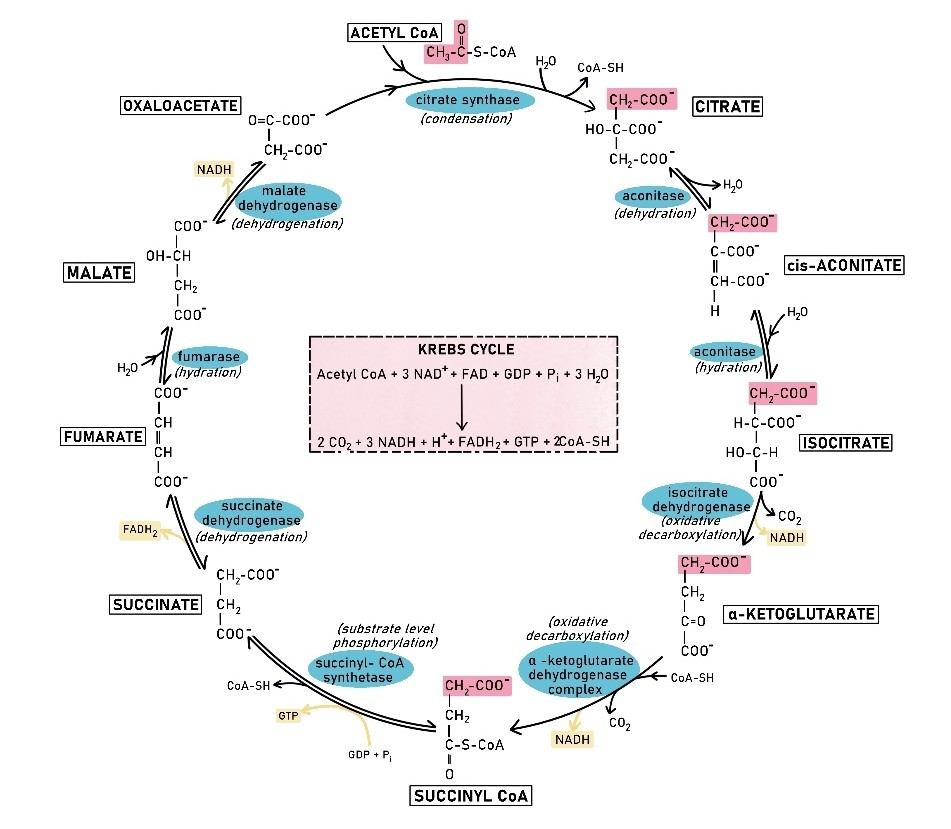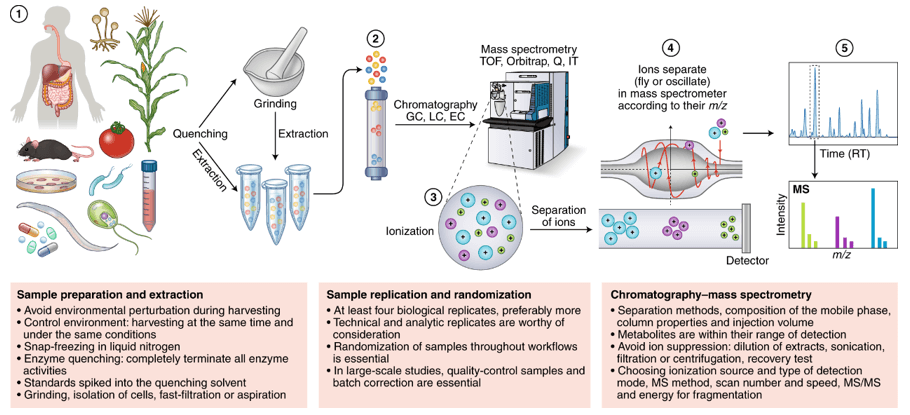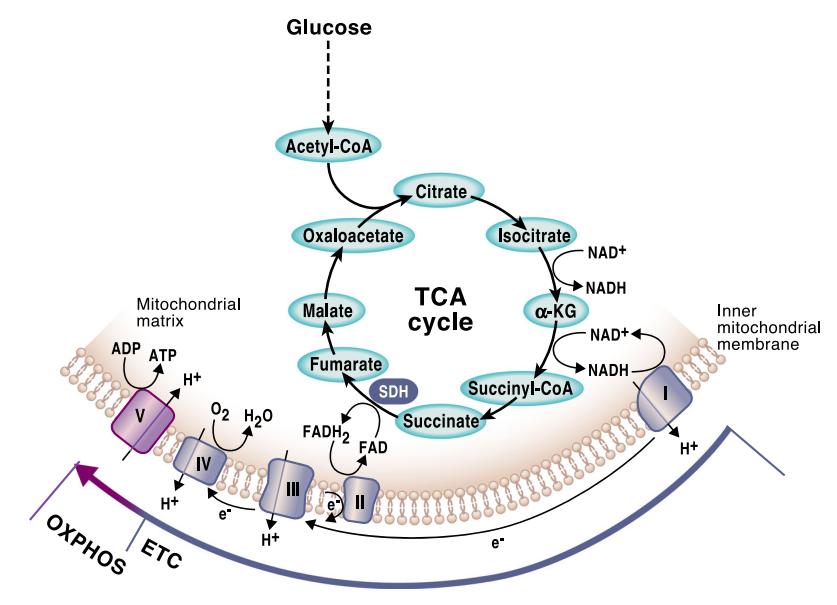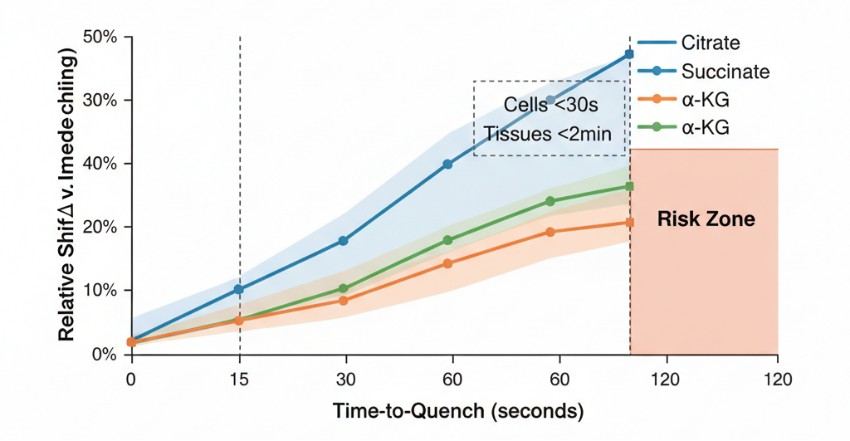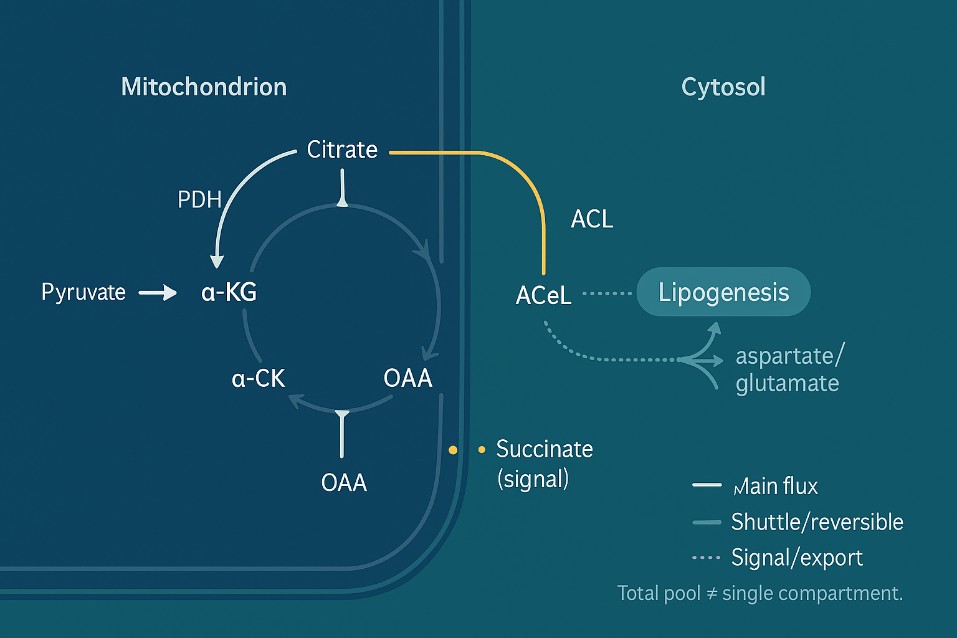Tricarboxylic Acid Cycle Metabolism Service
Submit Your InquiryWhat is Tricarboxylic Acid Cycle
The Tricarboxylic Acid Cycle, also known as the TCA cycle or the Krebs cycle, is the central metabolic cycle of carbohydrate metabolism and all metabolic pathways. It begins when the pyruvate formed in the cytoplasm of the cell during glycolysis is transferred to the mitochondria, in which most of the energy inherent in glucose is extracted (Figure 1). In the mitochondria, pyruvate is converted to acetyl CoA by the enzyme pyruvate carboxlase. Oxidation of acetyl-CoA by TCA cycle accounts for 2/3rd of total oxygen consumption and ATP production. TCA cycle plays an important role in many biosynthetic pathways like gluconeogenesis and transamination. deamination and lipogenesis. Therefore, aberrant TCA cycle function contributes to various diseases like cancer.
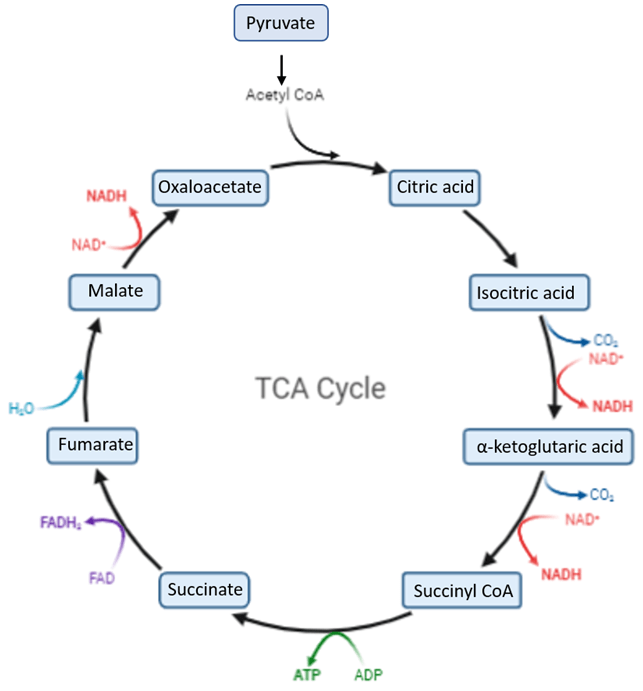 Figure 1. The overview of TCA cycle.
Figure 1. The overview of TCA cycle.
Studying TCA cycle metabolism provides insight into cellular respiration, energy production, and overall function of biological systems. By analyzing the TCA cycle, you can better understand the regulation of metabolic pathways, identify potential dysfunctions or abnormalities, and gain greater insight into a variety of physiological and pathological conditions. Creative Proteomics is a leading company in the field of metabolomics research. Our LC-MS-based approach allows for targeted and untargeted quantification of TCA circulating metabolites. We can measure the absolute concentrations of metabolites and assess their relative abundance in different biological samples or experimental conditions. In addition, our method allows for isotopic tracer experiments, enabling throughput analysis to determine metabolite turnover rates in the TCA cycle.
Applications of TCA Cycle Metabolism Analysis
Understanding cellular metabolism: Provides information on the intricate metabolic pathways within cells and their regulatory networks.
Investigating disease mechanisms: Discovery of metabolic alterations associated with various diseases provides potential diagnostic and therapeutic opportunities.
Biomarker discovery: TCA circulating metabolites can be used as potential biomarkers for disease diagnosis, prognosis and assessment of therapeutic response.
Unraveling metabolic disorders: To understand the pathogenesis of metabolic diseases such as diabetes, obesity and mitochondrial disorders.
Study energy metabolism: Understand energy production, ATP production and regulation of cellular energy homeostasis.
Assessing nutritional status: Evaluate nutrient utilization, metabolic adaptations, and the impact of dietary interventions.
Investigate cancer metabolism: Understand alterations in energy metabolism in cancer cells and identify potential therapeutic targets.
Investigate microbial metabolism: Elucidate the metabolic pathways and regulation of various microorganisms, including bacteria and fungi.
Environmental and agricultural applications: Explore microbial metabolism, soil health, and plant metabolic processes in environmental samples.
Service Workflow
The TCA cycle metabolites service provided by Creative Proteomics is based on our cutting-edge chromatographic separation and mass spectrometry platforms. The experimental workflow involves 4 steps: sample collection, metabolites extraction, MS data analysis and bioinformatics analysis (Figure 1). Our service will be tailored to specific samples and needs for optimal results.
 Figure 2. The overall workflow of TCA cycle metabolism service.
Figure 2. The overall workflow of TCA cycle metabolism service.
List of Detectable TCA Cycle Metabolites at Creative Proteomics
Sample Requirements of TCA Cycle Metabolism Assay
Cells: For cell samples, an adequate quantity of cells is recommended to obtain sufficient amounts of metabolites. Additionally, cell samples should have high purity and be processed as soon as possible after collection to prevent metabolite degradation.
Tissues: For tissue samples, the appropriate tissue type should be chosen based on the research objectives. Ensure that tissue samples are stored in a frozen or chilled state to maintain the stability of metabolites. Pre-freezing samples through techniques like snap freezing can help preserve the original state of metabolites.
Biological Fluids: Biological fluid samples such as blood, urine, cerebrospinal fluid, etc., are highly valuable as they reflect the metabolic status of the entire organism. Samples should be promptly refrigerated or frozen, and proper sample handling methods should be employed to avoid metabolite degradation and contamination.
Report Delivery
- Experimental procedures
- Instrument parameters of liquid chromatography and mass spectrometry
- MS raw data files and the summary of mass spectrometry data quality
- The identification/quantification of lipidic molecules data
- Bioinformatics analysis report (PCA, KEGG, etc.)
Equipped with advanced mass spectrometry for the determination of TCA metabolites, powerful bioinformatic analysis software and a panel of experienced technicians and scientists, we provide customer-tailored TCA cycle metabolites analysis service with rapid experimental procedures and easy to read report, to advance your scientific research.
References
- Muhammad Akram. Citric acid cycle and role of its intermediates in metabolism. Cell Biochem Biophys. 2014, 68:475-478.
- Nicole M Anderson, Patrick Mucka, Joseph G Kern and Hui Feng. The emerging role and targetability of the TCA cycle in cancer metabolism. Protein Cell. 2018 ,9:216-237.


